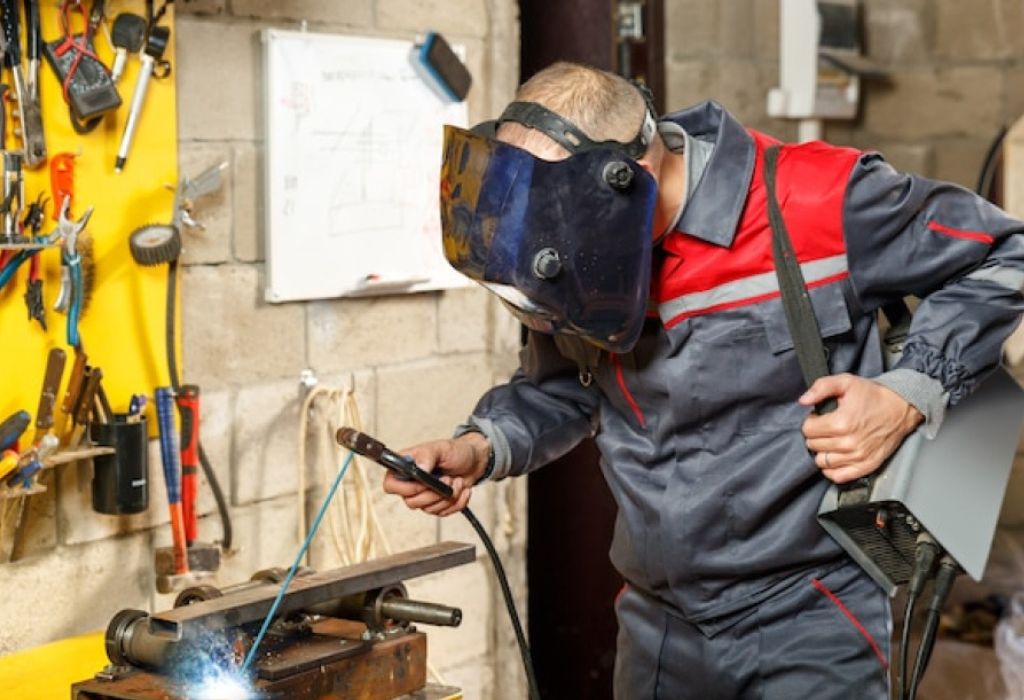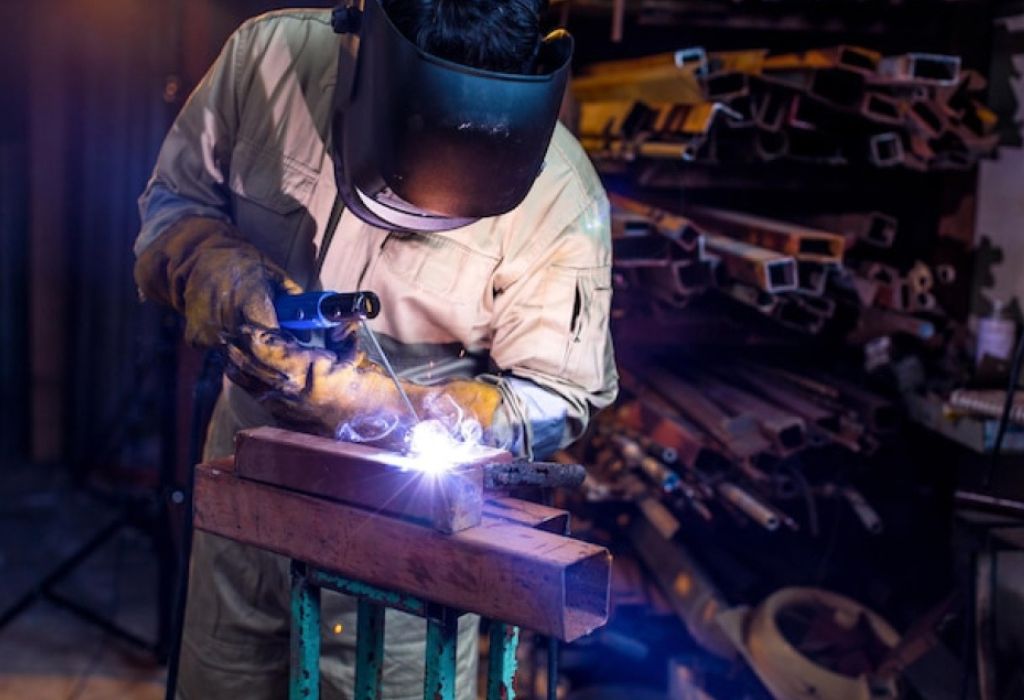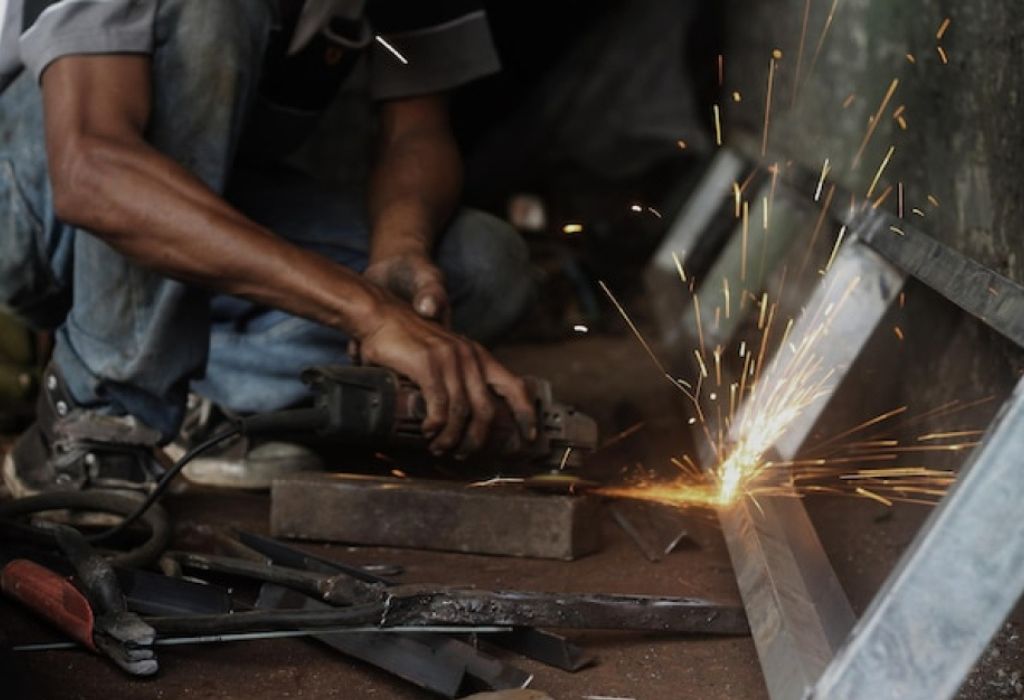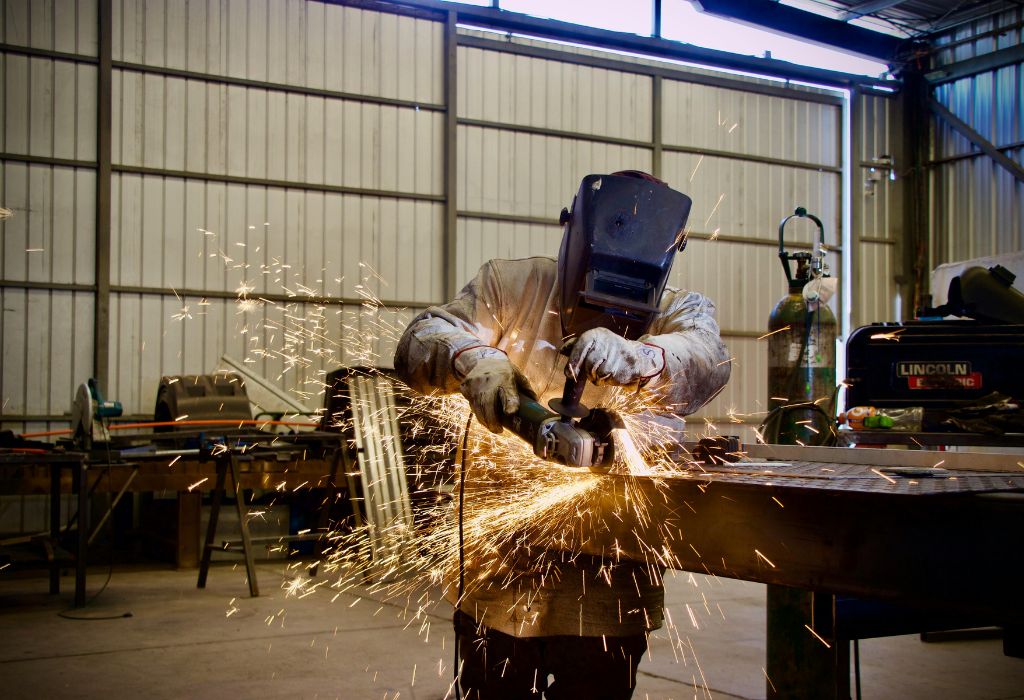A recent trade school graduate walks into their first job interview, welding hood in hand, and wonders: how much does a beginner welder make in 2025?
The answer is not as straightforward as it may seem, since location, industry, and skill level all shape the first paycheck.
Across the United States, entry-level welders often earn between $18 and $25 per hour, averaging around $22–$23 per hour according to job posting data (Indeed / ZipRecruiter).
For a full-time schedule, that equals roughly $40,000 to $48,000 annually before overtime. In comparison, the median annual wage for all welders was about $51,000 in May 2024, showing that beginners can climb quickly as they gain certifications and experience (BLS).
The need for welders also boosts pay potential. The American Welding Society projects a shortage of about 80,000 welders per year between 2025 and 2029, driven by retirements and increased demand in construction, energy, and manufacturing (AWS).
For those just starting, this shortage translates into more opportunities, faster raises, and higher job security.
Still, pay is not uniform. A beginner in a small fabrication shop may earn less than one who joins a union crew or takes a traveling pipeline job with per diem benefits.
Apprenticeship programs, shift differentials, and overtime can also significantly change total take-home pay.
This guide explores the numbers in detail, from national averages to state differences, industry-specific pay, and the impact of certifications. By the end, you’ll understand exactly what entry-level welders can expect in 2025 and how to maximize income in the first year.
Quick Answer — How to Become a Welder in NJ

The process begins with a high school diploma or GED, which most New Jersey training programs and apprenticeships require. This ensures a foundation in math, reading, and shop safety.
Next, enroll in a welding program at a trade school, community college, or vo-tech. These programs teach key processes like MIG, TIG, Stick, and Flux-Cored Arc Welding while preparing students for AWS performance tests. Many schools in NJ partner with Accredited Test Facilities (ATFs) so students can certify directly on-site.
Finally, complete OSHA-10 safety training, build a skills portfolio, and apply for apprenticeships or entry-level jobs. With AWS certification in hand, new welders can qualify for construction, fabrication, or industrial positions across the state.
Do welders need a state license in NJ?
No, New Jersey does not issue a welding license; employers rely on AWS certifications and bend tests.
Is AWS certification required for employment?
Not always, but most reputable employers prefer or mandate it for structural and pipe welding jobs.
How long does welding training take in NJ?
Training can take 3–9 months, depending on whether you choose a certificate, diploma, or associate program.
Can apprentices earn while learning?
Yes, registered apprenticeships in NJ provide wages, benefits, and paid certification opportunities.
What is the fastest way to get hired as a welder?
A short trade program combined with AWS certification and OSHA-10 safety training offers the quickest entry.
Step 1 — Meet NJ Basics (Diploma, Age, Safety)
Most New Jersey welding schools require a high school diploma or GED. Strong math skills, blueprint reading, and shop safety knowledge are valuable for success in training programs.
Safety is non-negotiable in the welding trade. Beginners should complete OSHA-10 construction or general industry training. Many employers also prefer OSHA-30 for higher responsibility roles.
Although NJ does not license welders, building a foundation in education and safety ensures smooth entry into technical training and employer testing.
Is a GED accepted by NJ programs?
Yes, nearly all New Jersey welding programs and apprenticeships accept a GED.
Which safety certification should new welders get first?
OSHA-10 is the standard entry-level safety credential.
Are background checks required?
Some employers require them, especially for government contracts.
Do you need to be 18 to start training?
Some programs accept students at 16; most jobs require 18+.
Is a driver’s license important?
Yes, many job sites in NJ require reliable transportation.
Step 2 — Choose a New Jersey Training Path
Training is the foundation of a welding career in New Jersey. Options include community colleges, vocational schools, and private trade programs.
Top programs in NJ teach multiple welding processes, blueprint reading, and inspection techniques. Many also provide access to AWS Accredited Test Facilities for certification.
Well-known choices include UTI Bloomfield, Lincoln Tech campuses, and county colleges like CCM that offer AWS-aligned training and job placement support.
How long are welding programs in NJ?
Programs range from 36 weeks to 18 months, depending on the credential.
Do schools help with job placement?
Yes, many have career services and employer partnerships.
Are night or weekend classes available?
Yes, many NJ schools offer flexible schedules.
Can financial aid cover welding programs?
Yes, FAFSA, workforce grants, and scholarships may apply.
Is hands-on practice guaranteed?
Reputable programs provide significant lab hours.
Step 3 — Earn AWS Credentials
The AWS Certified Welder (CW) credential is the gold standard for entry-level welders. It is a performance-based test taken at an Accredited Test Facility (ATF).
In the CW test, welders follow a Welding Procedure Specification (WPS) and produce test welds in specific positions. Passing welds are inspected or bend-tested for approval.
AWS certifications are portable across the U.S. and give NJ welders credibility with employers in construction, manufacturing, and repair.
Do AWS tests require classroom study?
No, they are strictly performance-based.
Which test is most common in NJ?
D1.1 structural steel plate tests are widely recognized.
Do AWS certifications expire?
They require ongoing maintenance forms to remain valid.
Where can you test in NJ?
Many schools and private ATFs offer certification exams.
Is the 6G pipe test valuable?
Yes, it is highly respected and opens higher-paying jobs.
Step 4 — Apprenticeships and Unions in NJ

Apprenticeships let welders earn while they learn, gaining real-world experience under supervision. Many NJ employers partner with trade unions to run registered programs.
Union programs often provide better wages and benefits, while non-union shops may offer faster hiring. Both paths are available depending on employer type.
NJ industries such as ship repair, utilities, and construction regularly hire apprentices and helpers with AWS certification.
How long are welding apprenticeships in NJ?
Usually 3–5 years with step pay increases.
Are apprentices paid in NJ?
Yes, apprentices earn wages while training.
Do unions cover certification costs?
Many unions pay for AWS tests during apprenticeships.
Can you join a union as a beginner?
Yes, some unions accept entry-level applicants with training.
Do apprenticeships lead to full-time jobs?
Yes, most graduates transition to journeyman roles.
Step 5 — Welding Salary in New Jersey
Pay varies by sector, experience, and credentials. According to CareerOneStop, welders in NJ earn from the 25th percentile at entry-level to higher wages with certifications and overtime.
The BLS national median is about $51,000, with the top 10% earning significantly more. Specialized processes like TIG and pipe welding raise income potential.
Wages also increase through union contracts, overtime, and per diem for travel assignments.
What is the average beginner welder salary in NJ?
Around the 25th percentile, rising quickly with overtime.
Which welding jobs pay best in NJ?
Pipe welding, structural steel, and industrial maintenance.
Can AWS certifications increase wages?
Yes, certifications directly impact pay rates.
Do union welders make more?
Often yes, due to negotiated wage floors.
Is overtime common?
Yes, especially in construction and shutdown projects.
Step 6 — Skills Employers Want
NJ employers look for welders proficient in MIG, TIG, Stick, and FCAW, along with blueprint reading and safety awareness.
Employers value punctuality, teamwork, and the ability to pass shop weld tests on demand. Documentation skills, such as completing WPS and WQTR forms, are also important.
Soft skills like communication and reliability often decide who gets promoted to foreman roles.
What welding process is most requested in NJ?
MIG/FCAW for structural work.
Do NJ employers value TIG skills?
Yes, especially for stainless and aluminum projects.
How important is blueprint reading?
It is essential for fabrication jobs.
Do welders need computer skills?
Basic digital literacy helps with modern job applications.
What personal traits matter most?
Reliability, safety focus, and problem-solving.
Step 7 — Timeline and Budget
A realistic timeline is 6–12 months from beginner to first job. This includes training, AWS testing, OSHA safety, and applying for entry-level roles.
Budgeting is essential. Costs include tuition, gear, AWS test fees, and consumables. Some employers or unions reimburse certification fees after hiring.
Planning reduces surprises and helps new welders transition smoothly into their careers.
How much do NJ welding programs cost?
Tuition ranges from $5,000–$20,000, depending on school.
What tools should beginners buy?
Helmet, gloves, jacket, grinder, and hand tools.
Do schools provide gear?
Some provide loaner PPE; others require personal gear.
Can financial aid help with tools?
Yes, aid sometimes covers supplies.
Are AWS retests expensive?
They add cost, so practicing beforehand is wise.
Outlook — Welding Careers in NJ

Welding demand in New Jersey remains steady, with opportunities in construction, utilities, shipbuilding, and advanced manufacturing.
Automation affects repetitive welding, but skilled welders with AWS credentials remain essential. NJ’s industrial hubs provide ongoing demand.
Welders who invest in training, certifications, and safety can build rewarding long-term careers in the state.
Are welding jobs stable in NJ?
Yes, especially in construction and manufacturing.
Will automation reduce demand?
Not for skilled welders who handle complex projects.
Which sectors are growing in NJ?
Energy, transportation, and ship repair.
Can welders move into inspection roles?
Yes, AWS CWI is a natural next step.
Do NJ welders travel for work?
Some take travel contracts with per diem pay.
Conclusion
Becoming a welder in New Jersey requires basic education, formal training, AWS certification, and safety credentials. Apprenticeships or entry-level jobs then provide real-world experience.
With strong demand across industries and wages rising with skills, welding offers a stable and rewarding career path. By following this step-by-step approach, anyone can learn how to become a welder in NJ and enter a field with lasting opportunity.

I’m Darrell Julian, the founder, lead writer, and hands-on welding enthusiast behind ArcWeldingPro.com. With more than 15 years of real-world welding experience, I created this platform to share what I’ve learned in the field, in the shop, and in the heat of the arc.


